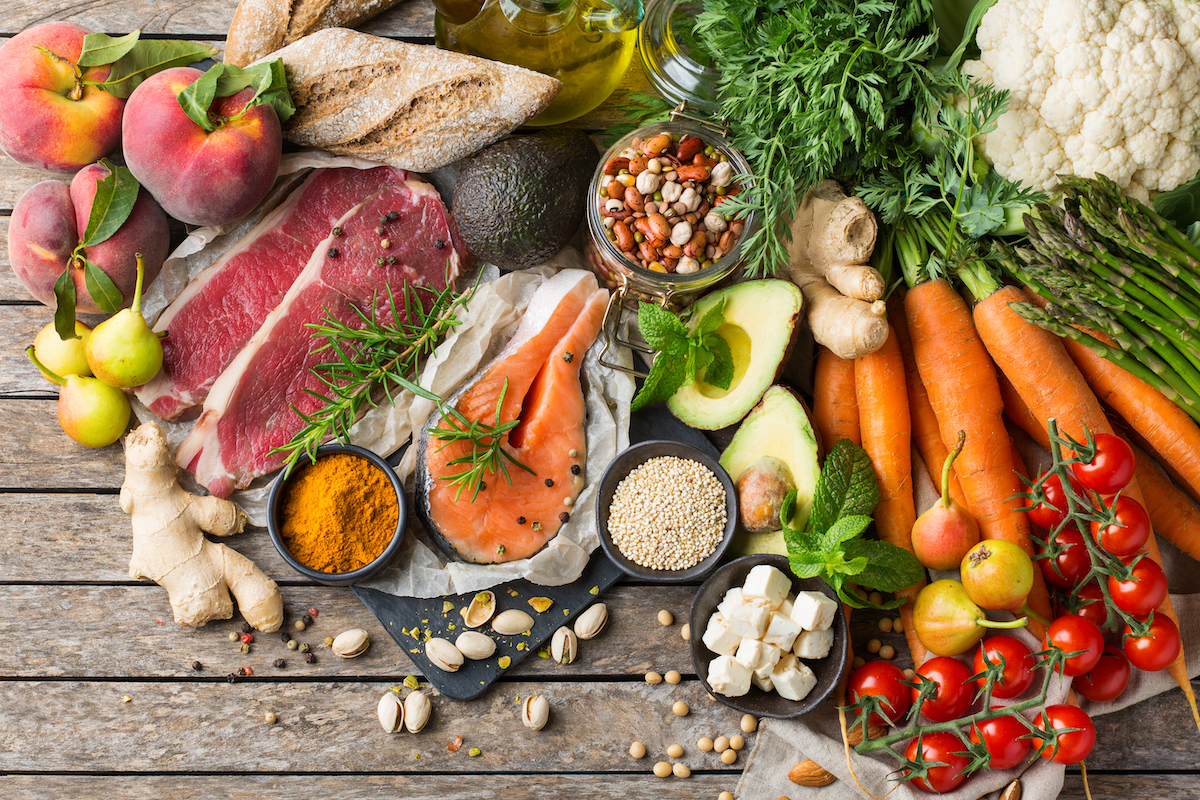Maintaining a healthy heart is vital for overall well-being, as the heart plays a central role in circulating blood and nutrients throughout the body. A balanced diet rich in heart-healthy foods can significantly reduce the risk of cardiovascular diseases and improve heart function. Eating a balanced diet and the right types of nutrient-rich foods can promote optimal heart health, helping you to feel good and maintain a healthier lifestyle.

Fish: A Source of Omega-3 Fatty Acids
Fatty fish such as salmon, mackerel, and sardines are excellent sources of omega-3 fatty acids, specifically eicosapentaenoic acid (EPA) and docosahexaenoic acid (DHA). These essential fatty acids have been associated with reducing inflammation, lowering blood pressure, and decreasing the risk of heart disease. Omega-3s play a role in maintaining healthy blood vessel function and regulating heart rhythm, which are critical for overall heart wellness. Aim to include fish in your diet at least twice a week to reap the heart-protective benefits. These essential fats are also found in flaxseeds and walnuts.
Berries: Packed with Antioxidants
Berries, such as blueberries, strawberries, and raspberries, are rich in antioxidants like anthocyanins and flavonoids. These compounds have been linked to improved heart health by reducing oxidative stress and inflammation, which are known contributors to heart disease. Enjoy a colorful mix of berries as a tasty and heart-healthy addition to your breakfast or as a satisfying snack.
Nuts and Seeds: Heart-Friendly Snacks
Almonds, walnuts, flaxseeds, and chia seeds are excellent sources of heart-healthy nutrients, including unsaturated fats, fiber, and plant-based omega-3 fatty acids. These nutrients can help lower LDL (bad) cholesterol levels and promote overall heart health. However, portion control is essential as nuts and seeds are calorie-dense. A small handful per day is sufficient to gain their benefits.
Leafy Greens: Nutrient-Packed Powerhouses
Leafy greens like spinach, kale, and collard greens are packed with essential vitamins, minerals, and antioxidants. They are particularly rich in potassium, which helps regulate blood pressure and maintain heart health. Mix these greens into salads, smoothies, or sautéed dishes to boost your heart-protective nutrient intake.
Whole Grains and Fiber-Rich Foods
Fiber is essential for heart health as it aids in reducing cholesterol levels and regulating blood pressure. Foods high in soluble fiber, such as oats, barley, legumes, and fruits like apples and oranges, are particularly beneficial. Whole grains, such as oats, quinoa, brown rice, and whole wheat, are rich sources of dietary fiber. These foods have a slower impact on blood sugar levels and can help manage weight, reducing the risk of heart disease and type 2 diabetes. Eating more fiber aids in reducing cholesterol levels and improving heart health by promoting a healthy digestive system, and can help prevent the buildup of cholesterol in the arteries and improve heart function. Swap refined grains for whole grains in your meals to keep your heart happy and your energy levels steady.

Heart-Healthy Cooking Oil
Olive oil is a staple of the Mediterranean diet, known for its heart-protective properties. It contains monounsaturated fats that can help reduce LDL cholesterol levels and lower the risk of heart disease. Use extra-virgin olive oil for salad dressings and low-heat cooking to reap its benefits.
Plant-Based Protein and Fiber
Legumes, including beans, lentils, and chickpeas, are rich in plant-based protein, fiber, and various nutrients. Their combination of protein and soluble fiber helps lower cholesterol levels, stabilize blood sugar, and improve heart health. Add tasty legumes into soups, stews, salads, or even as meat substitutes in your favorite recipes.
Lean Proteins
Choosing lean sources of protein is essential for heart health. Opt for lean cuts of poultry, fish, and plant-based proteins like beans, lentils, and tofu. Reducing the intake of saturated and trans fats from fatty meats can improve cholesterol levels and lower the risk of heart disease.
Green Tea
Green tea is known for its abundant antioxidants, particularly catechins, which have been linked to a reduced risk of heart disease. Regular consumption of green tea may help improve blood vessel function, reduce inflammation, and lower LDL cholesterol levels.
Dark Chocolate
Indulging in moderate amounts of dark chocolate (at least 70% cocoa) can be good for the heart. Dark chocolate contains flavonoids that have been associated with improved heart health by promoting healthy blood flow and reducing blood pressure.
Caring for your heart begins with making conscious choices about what you eat. Prioritizing heart-healthy foods in your diet is a proactive step toward maintaining optimal heart health. A balanced diet, coupled with regular physical activity and stress management, will go a long way in reducing the risk of cardiovascular diseases and promoting a healthier heart and body overall. A heart-healthy lifestyle begins with small dietary changes that can lead to significant improvements in heart health and the overall quality of your life.

Powerful Antioxidants and Vitamins
Lycopene, a powerful antioxidant found abundantly in red and pink fruits like tomatoes, watermelon, and pink grapefruit, plays a crucial role in promoting optimal heart health. Its remarkable ability to neutralize harmful free radicals in the body helps protect the cardiovascular system from oxidative stress, a major contributor to heart diseases. Lycopene has been linked to reducing inflammation, improving blood vessel function, and lowering blood pressure levels, all of which contribute to a healthier heart. Additionally, its role in preventing the oxidation of LDL cholesterol, often referred to as “bad” cholesterol, helps prevent the buildup of plaque in arteries, reducing the risk of atherosclerosis and ultimately supporting overall heart well-being. Incorporating lycopene-rich foods into your diet can be a flavorful and beneficial way to prioritize your heart health.
Resveratrol, a natural compound found in certain foods like red grapes, red wine, and berries, offers a significant boost to optimal heart health. This powerful antioxidant has gained attention for its potential to enhance cardiovascular well-being through various mechanisms. Resveratrol is known to improve blood vessel function, reduce inflammation, and help regulate blood pressure levels. Its ability to protect the inner lining of blood vessels promotes healthy circulation and reduces the risk of plaque buildup, which can lead to heart disease. Additionally, resveratrol has been linked to improvements in cholesterol profiles by increasing levels of “good” HDL cholesterol and inhibiting the oxidation of LDL cholesterol. Incorporating resveratrol-rich foods into your diet, in moderation, can be a delicious way to support your heart’s vitality and overall health.
Vitamin C, also known as ascorbic acid, is a vital nutrient that plays numerous essential roles in maintaining overall health and well-being. Beyond its well-known benefits for the immune system, also plays a significant role in promoting optimal heart health. As an antioxidant, it helps protect the cardiovascular system by combating oxidative stress, which can lead to inflammation and damage in blood vessels. This protective effect contributes to maintaining healthy arteries and preventing the development of atherosclerosis, a condition characterized by plaque buildup in the arteries. Vitamin C supports the production of collagen, a crucial protein for maintaining the integrity of blood vessels and ensuring their flexibility. By enhancing the health of blood vessels and reducing the risk of oxidative damage, vitamin C indirectly helps regulate blood pressure and improve overall heart function. As a powerful antioxidant, vitamin C helps protect cells from damage caused by harmful free radicals, which are associated with various chronic diseases and aging. This vitamin is renowned for its immune-boosting properties, as it supports the production and function of white blood cells that combat infections. Vitamin C is also crucial for collagen synthesis, a protein that supports healthy skin, connective tissues, and wound healing. Eat vitamin C-rich foods in your diet, such as citrus fruits, strawberries, and bell peppers, can contribute to supporting your heart’s well-being and lowering the risk of cardiovascular diseases.
Folate, a B-vitamin also known as vitamin B9, plays a pivotal role in promoting optimal heart health by contributing to various essential functions within the cardiovascular system. Folate is involved in the process of converting homocysteine, an amino acid, into methionine, another amino acid. Elevated levels of homocysteine have been associated with an increased risk of heart disease, and folate helps regulate these levels, thereby supporting heart health. Moreover, folate is crucial for DNA synthesis and repair, which contributes to the growth and maintenance of cells, including those in blood vessels. This vitamin also aids in the production of red blood cells, essential for oxygen transport throughout the body. Consuming folate-rich foods like leafy greens, beans, and fortified grains not only supports these vital functions but also promotes a healthier cardiovascular system, reducing the risk of heart-related issues.






 No products in the cart.
No products in the cart.